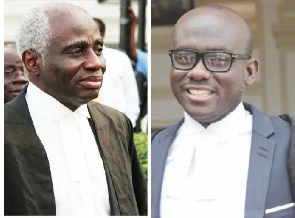The Attorney-General Godfred Yeboah Dame has described as incompetent, unmeritorious and unknown to the law on criminal procedure, a motion filed by veteran lawyer Tsatsu Tsikata in the James Gyakye Quayson perjury case.
The Attorney-General was opposing a motion filed by Tsatsu Tsikata seeking to set aside an order of the court to conduct a day-to-day trial of the case of perjury against Gyakye Quayson, the deposed Member of Parliament for Assin North.
Tsatsu Tsikata sought the authority of the court to suspend its day-to-day trial in order for Gyakye Quayson to pursue his desire to campaign and contest the by-election in his constituency occasioned by his sacking from parliament on grounds of ineligibility.
However, the Attorney-General, founding himself on several legal authorities, argued that the application before the court was alien to the law.
"Every step that ought to be taken in criminal procedure is clearly regulated by the Constitution and the statutes of Ghana. The laws on criminal procedure from the Constitution to Act 30 and the Practice Directions on the conduct of criminal cases do not permit this application. ” Godfred Dame said.
He described the approach by Tsatsu Tsikata as a grand attempt to waste the court’s time which militates against a speedy trial.
Godfred Dame stated that, first, the Constitution enjoins a speedy trial of criminal cases. The Constitution is clear in Article 19(1) that "a person charged with a criminal offence shall be given a fair hearing within a reasonable time by a court". This provision in the Constitution is to ensure that criminal cases are disposed off in a speedy manner.
Further, the Practice Directions for trial courts issued by the Supreme Court in 2017 require criminal cases to be heard from day to day.
The Attorney-General also argued that per the provision of Article 17 of the 1992 Constitution, all persons are equal before the law. If a teacher or farmer cannot refuse to attend or resist a daily hearing of his. criminal case because has to go to work, why should a politician be able to avoid trial because he wants to go and campaign?
The A-G argued that a grant of the application would result in discrimination contrary to the Constitution.
The A-G pointed out that he cannot understand the claim of lawyer for the accused person, that, if his client appears before the court on 22 and 23 of June, the right to vote of the people of Assin North who are not parties to any case before the court, will be affected when none of the constitutional rights of the Assin North constituents have in any way been tempered with.
The AG supported his argument by citing Sections 168 and 169 of the Criminal Procedure Act 1960 (Act 30). He signalled the importance of Section 168, which is titled “Appearance of both Act parties”. The provision states: “Where at the time appointed for the hearing of the case both the prosecutor and the accused are present before the Court, or if the prosecutor appears personally or by counsel and the personal attendance of the accused person has been dispensed with under section 70, the Court shall proceed to hear the case”.
Section 169, which is on “Adjournment”, states that; “Before or during the hearing of a case, the Court, a) may adjourn the hearing to a certain time and place to be then appointed and stated in the presence and hearing of the parties or their respective counsel then present, and;
b) In the meantime, may suffer the accused to go at large, or may commit the accused to prison, or may release the accused on the entry into a bond with or without sureties, conditioned for the accused person’s appearance at the time and place to which the hearing or further hearing is adjourned.
On the basis of these provisions, the AG urged that the Criminal Procedure Act gives the Court the power to decide the venue, time and date for court sittings and no other person or authority has the power to determine same or to change it.
According to the Attorney-General, the case of Republic versus Eugene Baffoe-Bonnie, established that criminal trials must be prosecuted within a reasonable period of time and that the courts of first instance must do everything possible to sit as regularly as possible to ensure that this is achieved.
Tsatsu Tsikata, in opposition to the AG’s arguments, averred that a speedy trial did not necessarily mean a day-to-day trial despite it being stated black and white in the Practice Directions of the Court.
He further argued that his client had a constitutional mandate to participate in politics and that the right to vote of the people of Assin-North will be adversely affected if the case proceeds from day to day.
The trial judge Marie Yanzuh adjourned the case to Friday, June 23, 2023, to rule on the day-to-day trial. Her Ladyship, however, excused Gyakye Quayson from coming to court on Friday for the ruling.
DO
General News of Thursday, 22 June 2023
Source: www.ghanaweb.com













